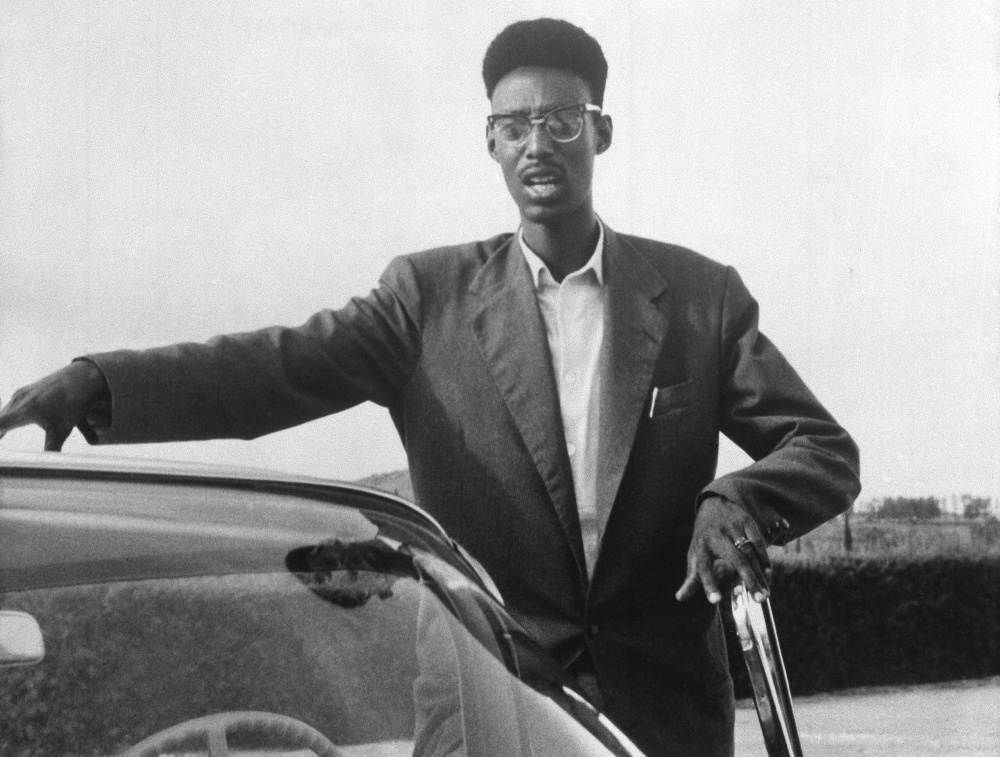Kigeli V Ndahindurwa, a Rwandan king who spent less than two years on the throne and more than a half-century in exile, living in penury as he decried the atrocities visited upon his people and seeking a restoration that never came, died Oct. 16 at a hospital in the Washington area. He was 80.
His death was announced by the Rwandan government. Guye Pennington, his private secretary, said the cause was an apparent heart ailment and that “for security” the king’s office was keeping the precise location of his death “under wraps.”
Kigeli – the name he took as king – had lived for the past 24 years in the United States, where he obtained political asylum. According to a 2013 profile in Washingtonian magazine, he resided in Section 8 housing in Oakton, Virginia, subsisting on government assistance, proceeds from the bestowal of honorific titles and the generosity of Rwandan refugees and others moved by the plight of a king without a crown.
Kigeli descended from the Tutsi dynasty that ruled Rwanda for centuries. He was in his early 20s when he ascended to the throne after the unexplained death of his half-brother Mutara III Rudahigwa in 1959. Shortly after Kigeli’s coronation, the majority Hutu ethnic group launched an uprising against the ruling Tutsis.
By the next year, social unrest had driven Kigeli from the country. In 1961, the Belgians removed him in response to the uprising, said Timothy Longman, director of the African Studies Center at Boston University. The monarchy was abolished, Rwanda became a republic and in 1962, it obtained independence from Belgium.
So began Kigeli’s years in exile. Deprived of his riches, which consisted mainly of large holdings of land and livestock, Kigeli approximated the duties of a king. In Nairobi, where he lived for many years, he held court on Sundays outside a movie theater.
“As a symbol he was very important,” Longman said, particularly for the tens of thousands of Tutsis who had fled Rwanda during the 1960s.
In 1992, Kigeli settled in the United States. He lived first in Takoma Park, Maryland, before moving to Oakton. Assisting him was his chancellor, Boniface Benzinge, who sold mattresses at Sears, Washingtonian reported, while not serving as the king’s aide-de-camp.
“You will meet the king at the stroke of noon outside the grocery store on Flower Avenue,” Benzinge once told a reporter for the St. Louis Post-Dispatch who had requested an interview. “You will recognize the king: He is 7 feet tall.”
Other accounts reported his height as 7 feet, 2 inches.
Two years after Kigeli’s arrival in the United States, Rwanda descended into the genocide in which Hutu extremists murdered 800,000 Tutsis and moderate Hutus. Kigeli sought to draw attention to his country’s suffering and raise money to support Rwandan orphans.
“My heart, which beats with both Tutsi and Hutu blood, grieves,” Kigeli told a Red Cross function that year in Vancouver.
“Rwanda must go back to the future,” he said. “Now the time has come to restore what has been good in the past.”
Two years later, he embarked on a “peace tour” sponsored by the International Monarchist League, an organization based in Britain that promotes monarchies and monarchical principles. He sought a return to his country, but only, he said, if Rwandans wanted him.
“I am hoping to go back,” he once told USA Today, “but I have no desire to impose myself on the people.”
Rwandan President Paul Kagame reportedly advised Kigeli that he was free to return to the country, but as a private citizen, not as a monarch. Kigeli remained in the United States.
He was born Jean-Baptiste Ndahindurwa, one of numerous children of King Yuhi V Musinga, in Kamembe, Rwanda, on June 29, 1936. He said that he grew up poor in Congo, where Belgians had exiled his father.
Kigeli later returned to Rwanda, where he was educated in Catholic schools before serving in the colonial administration. He said that he was unprepared for his selection as king.
“In the beginning, I was just shocked,” he told Washingtonian. “I asked: How can this have happened? But then I said, OK, this is my responsibility. I have to be courageous. I can’t go back. I’ve been given a responsibility. I have to fulfill it.”
Kigeli did not marry, in deference to a rule that kings take no wives in exile. Pennington declined to provide a complete list of survivors, citing “security reasons.” An heir has been selected and is expected to be announced in the next week, he said.
Among neighbors in Oakton, Washingtonian reported, Kigeli was known as “the king of Africa.”
Send questions/comments to the editors.



Comments are no longer available on this story